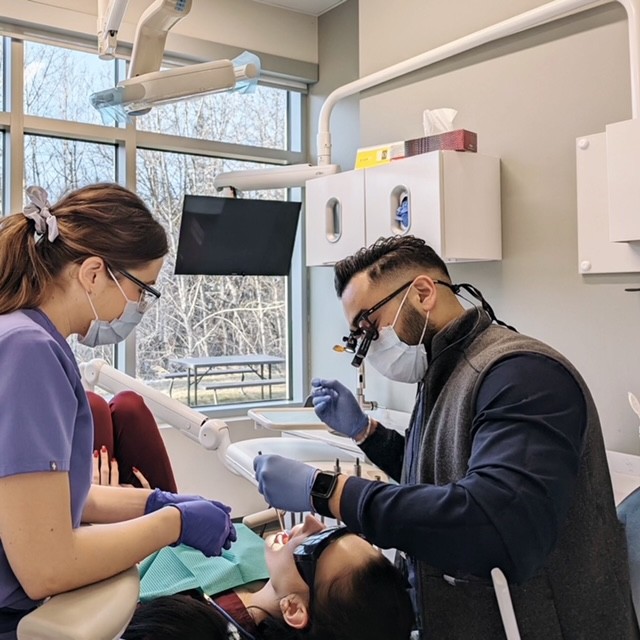Dental examinations are an important part of maintaining good oral health and preventing more serious issues down the line. They involve a detailed check-up performed by a dentist to assess the overall health of your teeth, gums, and mouth. But what exactly are dental exams for, what do dentists look out for, and why is it important to have one annually? Let's dive in!
What is a Dental Examination?
A dental examination is a comprehensive review of your oral health. It's typically performed once a year, although some individuals may need more frequent check-ups based on their specific needs. During the exam, your dentist will:
- Inspect Your Teeth and Gums: The dentist checks for cavities, gum disease, and signs of tooth wear or damage.
- Assess Your Overall Oral Hygiene: They will review your oral hygiene habits and offer tips on brushing and flossing to prevent issues.
- Examine Soft Tissues: Dentists also check your tongue, cheeks, and the roof and floor of your mouth for any signs of abnormalities, including oral cancer.
- X-rays: Dental x-rays may be taken to identify issues that are not visible during the physical examination, such as cavities between teeth or problems below the gum line.
What Do Dentists Look For During a Dental Exam?
A dental exam covers a wide range of issues, ensuring that your teeth and mouth are in the best possible condition. Here are some of the most common things your dentist will look out for:
1. Cavities
Cavities are one of the most common dental problems. Dentists check for visible holes or soft spots in your teeth that could indicate decay. Early detection of cavities can prevent the need for more invasive treatments like fillings or crowns.
2. Gum Disease
Gum disease, or periodontal disease, is an infection of the gums that can lead to tooth loss if untreated. Dentists look for signs of swelling, bleeding, or recession in the gums. Gum disease is often subtle and painless in the early stages, so regular exams help catch it before it becomes serious.
3. Oral Cancer
Dentists are trained to recognize the early warning signs of oral cancer, which is why routine dental exams can help with early detection. They will examine the soft tissues in your mouth for any lumps, sores, or unusual changes.
4. Tooth Wear and Damage
Over time, teeth can show signs of wear and tear due to grinding, acid reflux, or even the natural aging process. Dentists will assess whether the enamel has been worn down or if there are cracks that could lead to bigger issues.
5. Misalignment
Your dentist will check for any misalignment in your teeth or bite issues. Misaligned teeth can cause discomfort, difficulty chewing, and even affect your jaw. The sooner any issues are detected, the easier it is to manage them with treatments like braces or retainers.
6. Abscesses or Infections
Infections in the mouth can be dangerous if not treated promptly. Your dentist will check for signs of abscesses or other infections that could be affecting your teeth or gums.
Why Do We Need Annual Dental Exams?
Regular dental exams play a crucial role in ensuring long-term oral health. Here's why they are recommended every year (or more frequently, depending on individual needs):
- Early Detection of Problems: Many dental problems, like cavities, gum disease, or even oral cancer, don't cause obvious symptoms in the early stages. By visiting the dentist annually, you give your dentist the chance to detect issues before they become serious or painful.
- Preventive Care: Preventive care is a core goal of dental exams. By detecting and addressing minor issues early, you can often avoid more invasive treatments down the road. Preventive care also includes guidance on proper oral hygiene, diet, and habits that can prevent tooth decay and gum disease.
- Preserving Your Smile: Regular check-ups help you maintain a healthy smile for years to come. Not only do they help prevent tooth loss and cavities, but they also protect the appearance of your teeth and gums, keeping you confident in your smile.
- Improved Overall Health: Oral health is closely linked to your overall health. Conditions like gum disease have been associated with an increased risk of heart disease, diabetes, and other serious health issues. By staying on top of your dental health, you can help protect other aspects of your well-being.
- Cost-Effective in the Long Run: Regular dental exams are typically more affordable than extensive treatments. Catching problems early can save you from needing costly procedures like root canals, crowns, or tooth extractions.
What Happens if You Skip Dental Exams?
Skipping your dental exams can lead to a range of oral health problems, including:
- Untreated cavities that become larger and require more intensive treatment.
- Advanced gum disease that could lead to tooth loss.
- Development of oral infections that might require emergency care.
- A higher risk of serious health conditions like heart disease or diabetes.
In the long run, avoiding regular check-ups can lead to bigger, more expensive problems and may even impact your quality of life.
Final Thoughts
Dental examinations are an essential part of maintaining not only good oral health but also your overall well-being. Regular visits to the dentist help detect problems early, prevent future issues, and ensure that your teeth and gums stay healthy for years to come. So, don’t put off your next dental exam—schedule it today, and take a proactive step toward preserving your smile!

